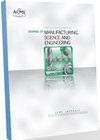同轴喷嘴辅助下屈服应力矩阵槽内单层通道的嵌入式3D打印
IF 2.9
3区 工程技术
Q3 ENGINEERING, MANUFACTURING
Journal of Manufacturing Science and Engineering-transactions of The Asme
Pub Date : 2023-10-19
DOI:10.1115/1.4063452
引用次数: 0
摘要
在厚组织中建立多层通道来模拟人体血管是器官生物制造中需要克服的主要挑战。目前的三维打印技术无法有效地制造多层中空通道。本研究旨在提出一种同轴喷嘴辅助的嵌入式3D打印方法,该方法通过相应的通道挤压不同的油墨材料,在屈服应力矩阵浴中形成核-壳细丝。芯墨、壳墨和基体液选用的材料分别为Pluronic F127 (F127)和氯化钙(CaCl2)、海藻酸钠(NaAlg)、聚乙二醇二丙烯酸酯(PEGDA)和纳米粘土。将基体浴液与壳体交联后,除去由牺牲油墨(F127)制成的核心层,生成单层中空通道。本文系统地研究了油墨材料性能和操作条件对芯壳细丝形成的影响。本文还对屈服应力基体液的流变学和力学性能进行了表征。一种带有嵌入单层中空通道的厚组织状结构已成功打印用于演示。由于设计具有核-壳-壳结构的同轴喷嘴是可行的,因此所提出的方法在技术上是可扩展的,可以在细胞组织结构中创建双层通道,从而在未来准确地模拟厚组织中的人体血管网络。本文章由计算机程序翻译,如有差异,请以英文原文为准。
Coaxial Nozzle-Assisted Embedded 3D Printing of Single-Layered Channels Within a Yield-Stress Matrix Bath
Abstract Creating multilayered channels for mimicking human blood vessels in thick tissues is the main challenge to overcome in organ biofabrication. Current three-dimensional (3D) printing strategies cannot effectively manufacture hollow channels with multiple layers. This study aims to propose a coaxial nozzle-assisted embedded 3D printing method in which core–shell filaments can be formed in a yield-stress matrix bath by extruding different ink materials through the corresponding channels. The materials selected for the core ink, shell ink, and matrix bath are Pluronic F127 (F127) and calcium chloride (CaCl2), sodium alginate (NaAlg), and poly(ethylene glycol) diacrylate (PEGDA) and nanoclay, respectively. After crosslinking the matrix bath and shell, the core layer made from the sacrificial ink (F127) is removed to generate a single-layered, hollow channel. In this work, the effects of ink material properties and operating conditions on core–shell filament formation have been systematically studied. The rheological and mechanical properties of the yield-stress matrix bath have been characterized as well. A thick tissue-like structure with embedded single-layered, hollow channels has been successfully printed for demonstration. Since it is feasible to design coaxial nozzles with a core–shell–shell architecture, the proposed method is technically extendable to create double-layered channels within a cellular tissue construct, accurately mimicking human blood vascular networks in thick tissues in the future.
求助全文
通过发布文献求助,成功后即可免费获取论文全文。
去求助
来源期刊
CiteScore
6.80
自引率
20.00%
发文量
126
审稿时长
12 months
期刊介绍:
Areas of interest including, but not limited to: Additive manufacturing; Advanced materials and processing; Assembly; Biomedical manufacturing; Bulk deformation processes (e.g., extrusion, forging, wire drawing, etc.); CAD/CAM/CAE; Computer-integrated manufacturing; Control and automation; Cyber-physical systems in manufacturing; Data science-enhanced manufacturing; Design for manufacturing; Electrical and electrochemical machining; Grinding and abrasive processes; Injection molding and other polymer fabrication processes; Inspection and quality control; Laser processes; Machine tool dynamics; Machining processes; Materials handling; Metrology; Micro- and nano-machining and processing; Modeling and simulation; Nontraditional manufacturing processes; Plant engineering and maintenance; Powder processing; Precision and ultra-precision machining; Process engineering; Process planning; Production systems optimization; Rapid prototyping and solid freeform fabrication; Robotics and flexible tooling; Sensing, monitoring, and diagnostics; Sheet and tube metal forming; Sustainable manufacturing; Tribology in manufacturing; Welding and joining

 求助内容:
求助内容: 应助结果提醒方式:
应助结果提醒方式:


